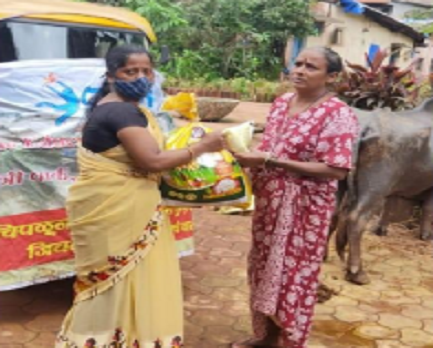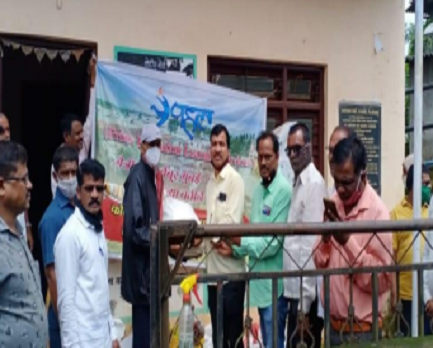THE SPIRIT OF MUMBAI AWARDS
IN COLLOBORATION WITH
THE SOUTH INDIAN EDUCATION SOCIETY
&
SRI SHANMUKHANANDA FINE ARTS & SANGEETHA SABHA
The South Indian Education Society and the Sri Shanmukhananda Fine Arts & Sangeetha Sabha epitomize the Spirit of Mumbai. These institutions are part of living history, monuments to education and cultural synthesis, epitomizing the city it belongs to and in a larger sense the country itself.
Corona virus disease (COVID-19), had a catastrophic effect on the world's demography resulting in more than 6 million deaths and easily the worst global health crisis witnessed in over a century. It ravaged countries and overwhelmed even the best healthcare systems. Loss of livelihood due to prolonged shutdowns had a crippling effect on the global economy. Several countries are still enduring the waves of the viral illness due to the sporadic appearance of mutant variants of the virus.
At the outbreak of Corona Pandemic in 2020, the world, including India, was not prepared and unaware as to how to tackle the spread of the contagion. Lockdowns, avoiding public exposure, masking, keeping physical distance, maintaining good hygiene etc. were recommended and adopted where possible. Those afflicted with the deadly virus had to be isolated, hospitalised, treated with various medicines etc., while the world over there was a furious race to identify the vaccines which could protect against or diminish the impact of the virus.
India's management of this crisis was commendable given the size of the country, the vulnerability of its large population and the limitations of its health-care system. We emerged stronger from the pandemic. A highly effective & co-ordinated inter-governmental plan between the centre and the states controlled the transmission. A record vaccination of about 225 crores doses helped halt the lethal impact of the virus.
And then, there were several extra-ordinary "ordinary people" who did not succumb to fear and showed tremendous courage of conviction and service in the face of most trying circumstances. A few Mumbaikars, unmindful of the grave risk to their lives due to public exposure, went much beyond their call of duty and thus saved thousands of lives in our city, and many paid the highest price for such valour. During this surreal period, there emerged in Mumbai many heroes - warriors in the war against Corona. These champions embody the Spirit of Mumbai - unrelenting courage in the face of adversity. Such heroism and selfless sacrifice needed to be recognised, applauded and remembered.
Hence, on the 3rd anniversary of the pandemic- 25th March 2023 - The South Indian Education Society (SIES) and Shri Shanmukhananda Fine Arts & Sangeet Sabha jointly. organised a felicitation ceremony. Dr V. Shankar - the President of SIES and the Sabha, Dr R. Chidambaram- the former Chairman of Atomic Energy Commission, Dr. V. Rangaraj - Vice President of the Sabha & Shri M. V. Ramnarayan- the Vice President of SIES and other members of both the entities invited the Honourable Governor of Maharashtra, Shri Ramesh Bais to present the 'Spirit of Mumbai' awards to the heroes of the Corona Battle at the Shanmukhananda Chandrashekharendra Sarswathi Auditorium, Mumbai.
The Heroes & Warriors who were awarded the Spirit of Mumbai Awards :
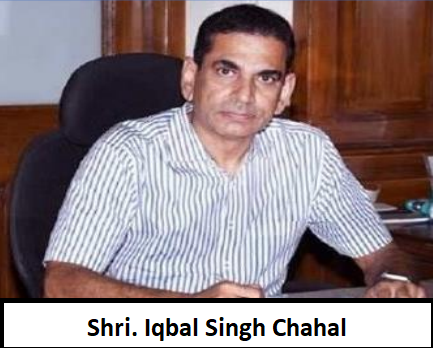
Shri. Iqbal Singh Chahal - A 1989 batch IAS officer of Maharashtra cadre, has served Government of Maharashtra and India in various capacities. He was the principal secretary of the urban development department before taking up the role of BMC chief from Praveen Pardeshi in May 2020.
Chahal is widely given the credit for keeping COVID-19 under check in Mumbai. Supreme Court of India and High Court of Maharashtra also lauded Chahal for his Mumbai Model. He added thousands of beds through new field hospitals, many private facilities were handed over to the government for COVID-19 wards with 800 vehicles being turned into ambulances. A proactive approach was used to focus on 55 slum areas including, Dharavi, where a strict lock-down was accompanied by aggressive sanitation of public toilets, mass coronavirus screening and a huge volunteer effort to ensure that nobody went hungry. All positive test reports in Mumbai were routed through "war rooms".

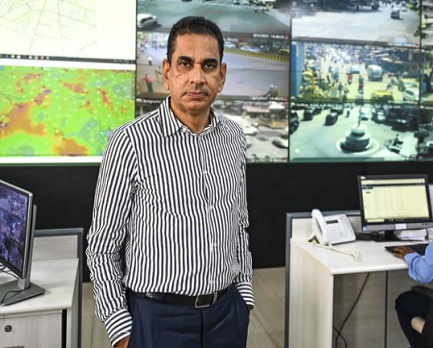
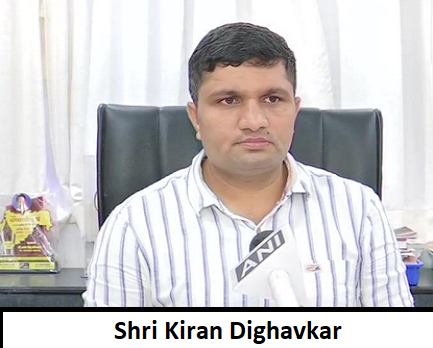
Shri Kiran Dighavkar, A civil engineer by education has been working with MCGM as an Assistant Commissioner since 2013. Originally from the city of Satana in Nashik District, Dighavkar considers Mumbai to be his karma-bhoomi and has been tirelessly working towards the betterment of the city, extensively with slums of South Mumbai area. This exposed Dighavkar to the many disguises of Mumbai. Working on curbing the virus in Dharavi, Asia's largest slum, has been a challenge as well as a learning experience for him. An integral part was shaped known as the 'Dharavi Model', He was one the key faces in BMC's fight against Covid-19 since the pandemic broke out in March 2020.
He led the fight and roped in many industrialists, celebrities, and corporates to chip in with money to buy equipment's, food kits and vaccinations.

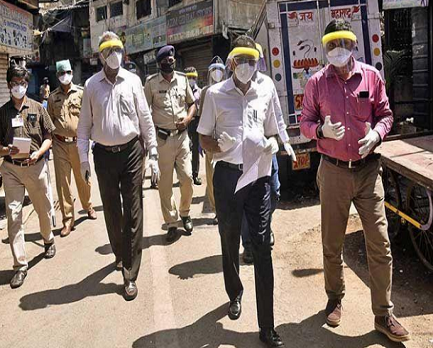
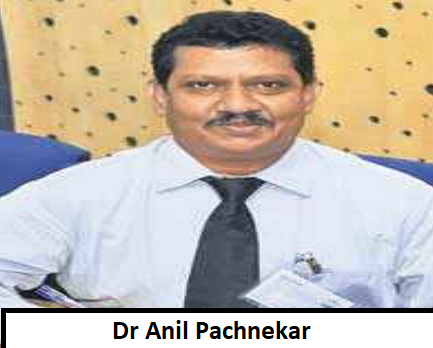
Dr Anil Pachnekar, a 60-year old General Practitioner who was the first among the 24 who joined hands with BMC in the entire month of April 2020, they did door to-door screening, visiting all the narrow lanes in high-risk area of Asia's biggest slum area, Dharavi. Wearing full-body protective kits in this peek summer was a task by itself! Dr Pachnekar recalls his efforts in counselling and convincing many whose oxygen saturation levels kept dropping below 80, and out of fear were not willing to get themselves admitted to the hospital. He & his healthcare unit have been serving this area for past 37 years, the long with standing relationship with the residents of this area has developed profound trust amongst the residents, and that was the only cause of comfort in following Dr Pachnekar & histeam's advice to get themselves screened & admitted. On Dr Pachnekar’sinsistence BMC roped in approx 350 GPs to help overcome challenges in this crucial drive. They jointly started a mass screening exercise to determine how far the virus had spread, the civic body decided to drop door-to-door screening instead of screening at their clinics.
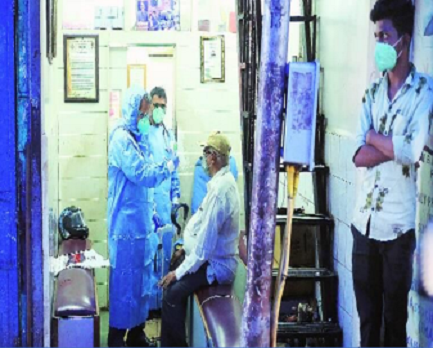
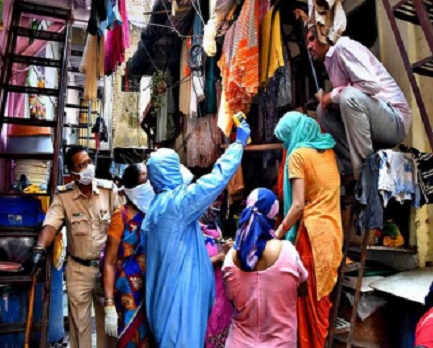
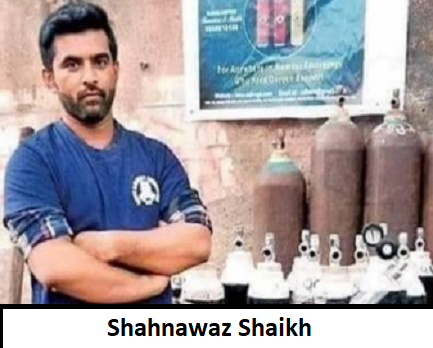
Shahnawaz Shaikh, a 31-year-old resident of Malad sold his Rs 22 lakhs SUV Ford Endeavour, which he had bought in 2011, to start an oxygen supply scheme during the crucial pandemic episode to save the lives of deprived corona patients. Shahnawaz Shaikh's initiative to supply oxygen started after his friend's pregnant sister passed away due to lack of oxygen in an auto-rickshaw. This episode prompted him to raise money by selling his precious asset for buying oxygen cylinders. He managed to procure 160 cylinders and set up a squad establishing control rooms, to assist needy people to coordinate and communicate effectively. Amid the crisis, the demand for supply of oxygen cylinders had increased manifolds. Initially he was answering 50 calls for oxygen supply daily, which shot up to 500- 600 calls every day. He has become a social media star since then and is known as the oxygen man of Mumbai.
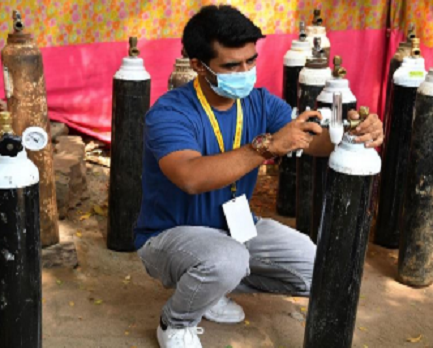
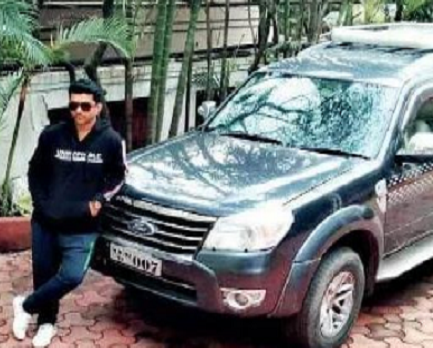

Pascal Saldhana, a 'mandap decorator', received a call on 18th April 2020 from a school principal who requested him to spare an oxygen cylinder which was kept at home for emergency, upon the urge of his wife who was on dialysis for past 5 yrs after both her kidneys failed, and he in his heartening gesture did so. He intensified his Covid relief effort on his wife's insistence by selling off her jewellery worth Rs 80,000 and support the noble act of establishing the business of distributing free oxygen cylinders to covid-19 victims, many people selflessly joined him with fund contribution that provided him enough capital for this cause. The story of Pascal shows that you do not really need to be born with a silver spoon, but surely need a heart of gold to help.
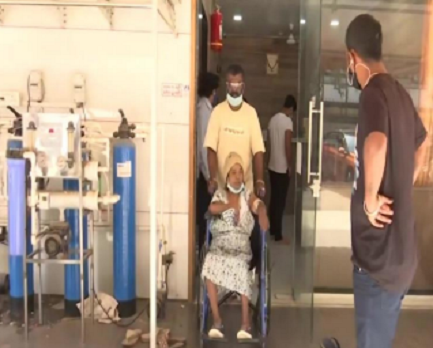
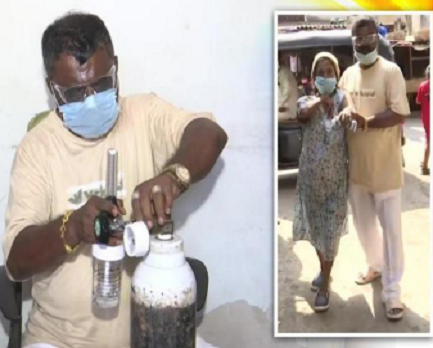
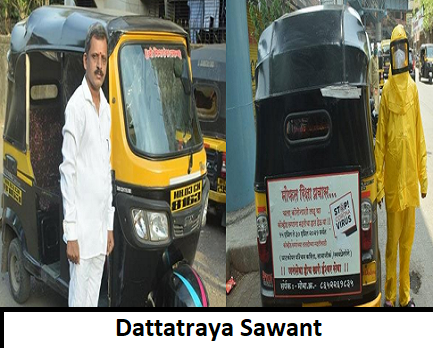
Dattatraya Sawant, 48-year-old, who lives in suburban Ghatkopar, teaches as a part-time English teacher at Dnyansagar Vidya Mandir who is also an auto-rickshaw driver in Mumbai came forward to help the coronavirus patients by providing a rickshaw service from the hospital to home and vice versa for free. Amid the devastating second wave of the COVID in April 2020. When the schools got shut down and online classes were also on hold, he decided to utilise the time in helping in the fight against COVID-19. While taking all precautions like wearing a personal protective equipment (PPE) kit, sanitisation and other he started a free 24x7 auto-rickshaw ambulance service for the people who were finding it difficult to go to the hospital; they were not getting an ambulance on time, ambulances were charging a high price around his area of residence, he also made some changes in his auto and started day and night service. He overall provided free travel to more than 100 patients which included both COVID and non-COVID patients.
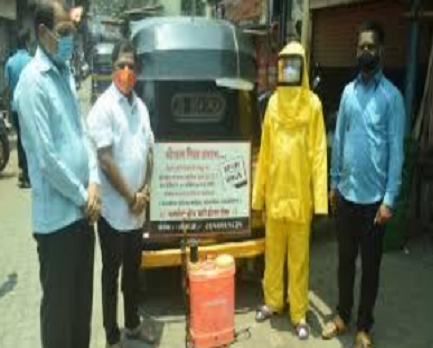
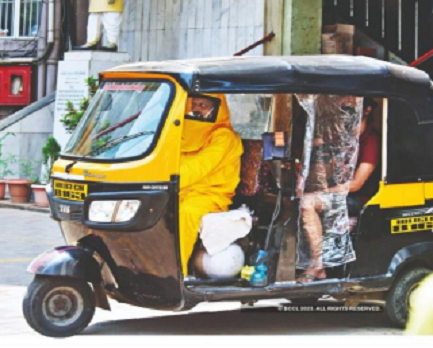
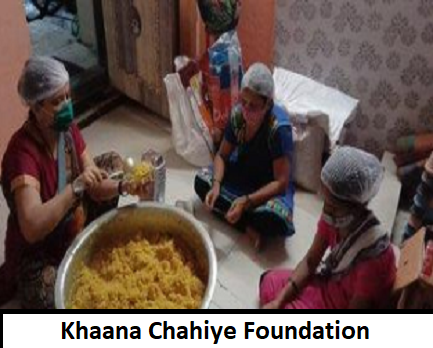
A movement powered by the bravery, kindness & hard work of the citizens of Mumbai, is a non-profit organization established to combat hunger. It was founded on 29th March 2020 as a relief effort during the COVID-19 lockdown with a pilot of 1200 meals on the Western Express Highway by Ruben Mascarenhas, Rakesh Singh, Swaraj Shetty, Anik Gadia, Neeti Goel, Shishir Joshi and Pathik Muni. It is powered by 200 + citizen volunteers in partnership with the citizen collective Litmus Test Project, Project Mumbai and Bharat Utthan Sangh. Along with immediate relief, Khaana Chahiye conducts advocacy efforts through its policy intervention - The Hunger Map Project.
One of their realization while providing emergency relief during the Covid-19 pandemic was that Mumbai required a functional crisis management infrastructure to aid the system during extreme situations like an economic shutdown. The Hunger Map Project was evidence-based policy intervention aimed at improving the already existing system by identifying critical pockets in the city which required urgent assistance and came up with effective solutions. It aimed to propose a model of relief methods with an active participation from the civil society in coordination with the local government infrastructure. It worked in sync with the strategy at various phases.
- Phase 1: Mapping the homeless population.
- Phase 1: Mapping the homeless population.
- Phase 1: Mapping the homeless population.
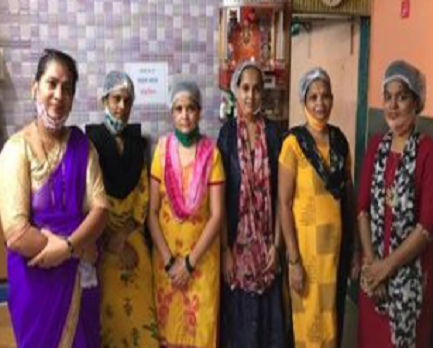
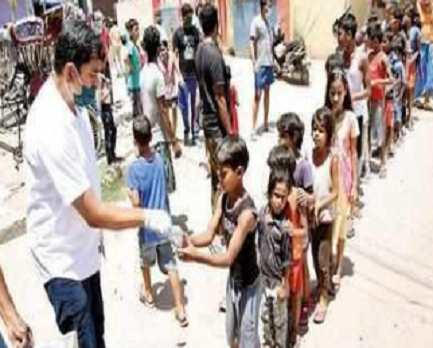
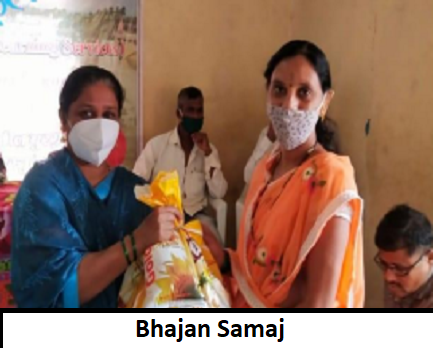
Bhajan Samaj at Garodia nagar Ghatkopar, East was started as a Bhajan performing group by late R V Sridharan his group of friends. Shri Hari Iyer is the honorary secretary of the temple. Bhajans were performed on Saturdays by visiting various houses and in 1966 Sri Ramanavami celebrations were conducted by him at Garodia School and Lions Club Hall. Later Garodia family donated a piece of land which is the present Bhajan Samaj Complex.
COVID had taken a heavy toll on the livelihood of marginalized people working in small & Self-Help Groups. It had become difficult for them to earn two square meals a day. As the 'New Normal' began to resume, Bhajan samaj had taken up the initiative of 'Rebuilding Lives' to support the livelihood of those who had lost their sources of income during these testing times. In resonance with VOCAL for LOCAL, they reached out to the deprived communities and supported their families even beyond COVID by donating ration kits.
